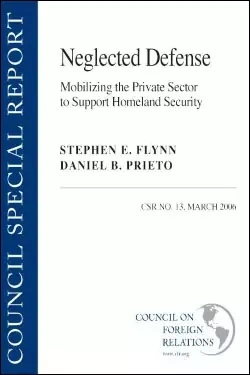
Neglected Defense
Mobilizing the Private Sector to Support Homeland Security

- Council Special Report
- Concise policy briefs that provide timely responses to developing crises or contributions to current policy dilemmas.
More on:
Overview
The withering scrutiny that ports have received in recent weeks has highlighted America’s ongoing state of national vulnerability.
In the fifth year since 9/11, federal efforts to enlist the private sector in bolstering homeland security remain largely stillborn. In January 2005, the Council on Foreign Relations initiated a year-long project, informed by a nonpartisan working group drawn entirely from the private sector, to assess and identify practical solutions for what is inhibiting progress on this vital agenda. Neglected Defense: Mobilizing the Private Sector to Support Homeland Security is the fruits of that effort. The central finding is that the federal government has had a naïve view of what the market is able to do when left largely on its own to protect critical infrastructure. First and foremost, the private sector needs active and sustained leadership by the White House and Congress. Washington needs to set priorities based on risk and consequences versus politics as usual. It needs to move beyond clarion calls for the private sector to do more and establish smart regulations where industry seeks them and provide meaningful incentives for their early adoption. Agency heads must be held accountable for their foot dragging on information sharing. Finally, the federal government needs to resolve the questions of who pays, and tackle the many unique liability issues associated with security. Everything that can be done is not being done to redress America’s most glaring vulnerabilities.
Questions and comments about this report can be directed to Stephen Flynn ([email protected]) and Daniel Prieto ([email protected]).
More on:
 Online Store
Online Store